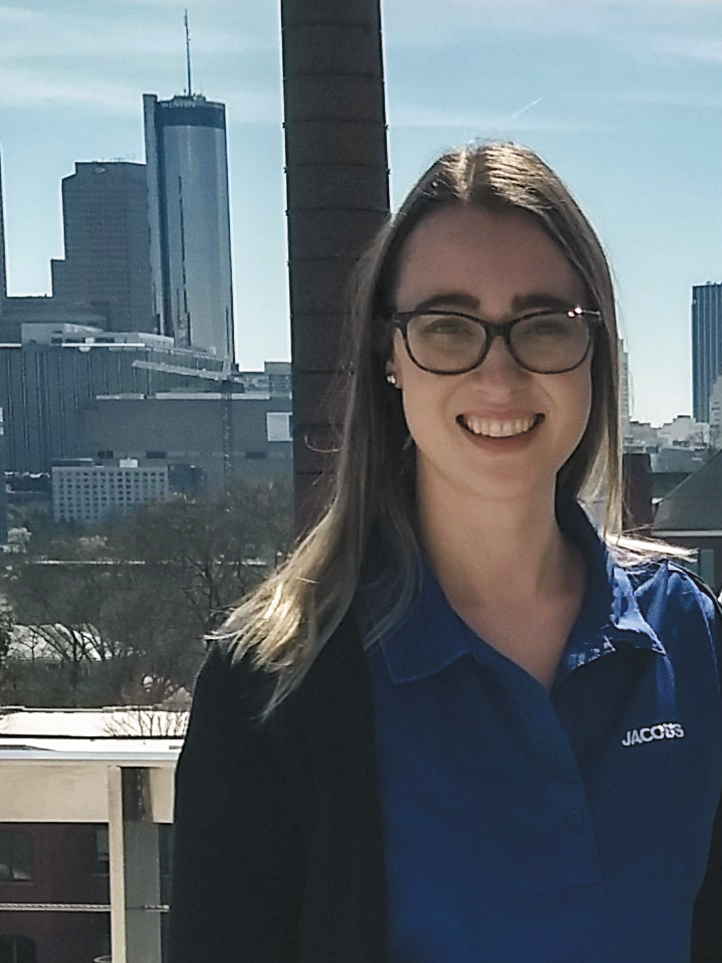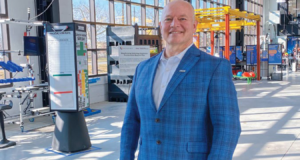CAITLIN KNIGHT
When I was growing up, I enjoyed solving problems. As I progressed through high school, I realized that I could use these skills in the workplace and that they could set me on the path to a rewarding, fulfilling career. Engineering was high on my agenda when it came to career choices because it combines problem-solving with the potential to really change people’s lives for the better.

I studied at Clemson University in South Carolina and graduated with a chemical engineering degree. After I left college, I went to work for a Gulf Coast chemical company; while this gave me a good professional start, I was really looking for a role that would provide me with the platform to apply my problem-solving skills with regard to project design. Ideally, I was looking for a role as a process engineer at an engineering and design firm. Jacobs has proved to be a great fit.
I am proud to work in a progressive, forward thinking industry, one that is providing mentoring and growth opportunities to young professionals, while also offering people great flexibility as they go through transitions in their lives.
A CHANGING INDUSTRY
While many of my colleagues have an educational background in paper science and engineering, professionals from chemical and mechanical engineering as well as other fields are attracted to the pulp and paper industry. There is interest from professionals with varied backgrounds because the industry is undergoing considerable change: great efforts are being made to advance the sustainability of the sector by reducing water use and emissions across the pulp and paper industry. Many projects I work on now focus on reducing environmental impacts.
This pivot toward sustainability means that the perception of pulp and paper among the wider engineering sector is changing. Professionals who work in other areas realize that it is in the middle of a significant cultural transition and are being attracted to opportunities in the industry. In turn, this is creating a more diverse workforce, so mentoring, support, and growth opportunities need to reflect the fact that pulp and paper professionals have varying needs and come from different backgrounds.
TALENT RETENTION
As pulp and paper undergoes change, access to mentorship programs remains a main priority for young professionals. In the July 2020 TAPPI Young Professionals Division (https://yp.tappi.org/) survey of under-35s in pulp and paper, 85 percent of respondents said that mentorship programs were beneficial. Mentorships help young professionals build on-the-job experience and equip them to take full advantage of growth opportunities, which is another main reasons to pursue a career in this sector.
In order to connect individuals to the relevant mentors and the right opportunities based on their skillsets, supervisors and employees must create spaces and set aside time during daily activities to facilitate conversations with young professionals. Opening those lines of communication to create a two-way conversation will allow younger staff to be proactive and discuss what they hope to achieve in their careers.
Frequent, collaborative communication is especially productive: it helps employees set career goals, while ensuring that the sector matches skilled professionals to the relevant growth opportunities. It is vital for pulp and paper companies to foster career growth, as it is one of the main factors that influence young professionals to remain in their current jobs; other factors include company culture and performance-based compensation and benefits, according to the TAPPI survey.
MENTORING
I can identify with what the young professionals surveyed say that they expect from the pulp and paper industry, as it closely aligns with my own experiences. During my first few years with Jacobs, I learned a lot: I built up my knowledge of mass and energy balances, trained extensively with WinGEMS software, and gained valuable on-the-job experience. I also benefitted hugely from the mentorship I received from our pulp and paper subject-matter experts (SMEs), who were always generous with their time when it came to imparting their knowledge.
My mentoring took place on an informal schedule. The SMEs provided guidance and advice on an ad hoc basis, and they also invited me to sit in on their monthly check-in meetings where they would discuss ongoing projects. Being able to listen in during meetings and hear their discussions gave me a deep understanding of how teams collaborate to deliver pulp and paper projects.
Combined with my formal training, this mentoring really equipped me to support our clients, and taught me the value of learning from colleagues and of not being afraid to ask for support and advice.
FLEXIBILITY AND OPENNESS
This past year has also seen a big change in my personal life, and I took on a new role as a mother. Getting the work-life balance right and ensuring that I have enough time for my family and my career has been challenging, but my project team and supervisor are extremely supportive, providing me with the flexibility I need to adjust my working hours.
Jacobs has also cultivated a culture of openness, and this allows me to talk with my colleagues about any of the challenges I face in my home life. This is a huge benefit; I feel that my personal life does not need to exist separately from my professional career.
As a working mother, being able to have those conversations at work has made all the difference. It has also made me appreciate how important it is that my colleagues can have the same type of flexibility and openness as they face their own changes and challenges in their personal lives, such as caring for an elderly parent or relative.
WORKING THROUGH THE PANDEMIC
The other big change in our lives this past year has been the coronavirus. As we navigate an increasingly virtual work environment, my team is working hard to ensure that we all stay connected while we remain apart. There are some things that we used to take for granted, but that we can no longer do; I really miss being able to join conversations in the office and having the opportunity to catch up informally with colleagues to discuss the projects they’re working on. Those casual, face-to-face interactions are no longer common, but we have all learned to become more intentional about using technology to strike up conversations with colleagues.
While there are a range of virtual networking opportunities available to new and existing team members, I’m especially mindful of the need to stay connected with newer colleagues and to ensure that they feel included and part of the team. Nothing beats the personal touch, and reaching out to connect is even more important than before.
Of course, the flipside is that we now have different types of connections. Due to Jacobs’ global reach, we now work almost exclusively on a virtual basis and are more connected and integrated with colleagues across different time zones and territories. From a work perspective, this makes collaboration across project teams seamless and more efficient.
The need for remote working also had an unexpected effect when it comes to talent retention: the young colleagues I manage can now avail themselves of opportunities to work on short-term assignments and gain critical on-the-job experience without relocating or changing their job roles.
A COMMON THREAD
Part of being a problem solver is having the ability to see the big picture. When I look at the pulp and paper industry I see a common thread: all of the support, opportunities, and flexibility it offers young professionals—including working mothers and diverse colleagues from a variety of engineering backgrounds—makes it a great sector to work in, now and into the future.
Caitlin Knight is a process engineer with Jacobs in Greenville, SC; contact her at [email protected]. Jacobs provides efficient solutions to the pulp and paper industry’s most complex problems. From global consulting to seamlessly integrated engineering, procurement, and construction management services, Jacobs understands the technologies and best practices that drive success. Visit jacobs.com.
 Paper 360
Paper 360
